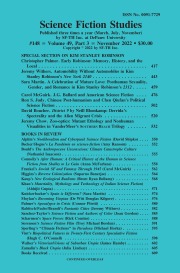Article
Finance Speculation, Indeterminacy, and Unforeclosed Futures in James Tiptree, Jr.’s "The Girl Who Was Plugged In"

This essay argues that James Tiptree Jr.’s “The Girl Who Was Plugged In” disputes capitalism’s considerable hold on the future through temporal and material indeterminacies that maintain the openness of the future. Drawing on genre discussions of speculative fiction’s homologous relationship to contemporary capitalism, this essay contends that Tiptree’s story stages the future as a contested site between capitalism and the reader. Specifically, I argue that the story is replete with indeterminacies that insist on both the uncertainty of the future and the possibility of imagining futures that are not cannibalized by capitalism, markets, and financial tools that bank on speculation. In conversation with feminist materialist theory, which attends to materiality’s unruliness and uncontrollable capacities, I specifically analyze the story’s emphasis on material bodies and corporeality as generating strange, technologically impossible agencies that wrest the future from the time-travelling narrator and encourage the reader to take hold of the future by imagining unthinkable possibilities for the future, particularly those that imagine a future not foreclosed by capitalism. Attending to both the prevalence of fleshy bodies as well as the story’s time-travel conceit, I read these narrative elements as tactical paradoxes that destabilize the boundaries between the thinkable and the unthinkable, the possible and the impossible within capitalism.